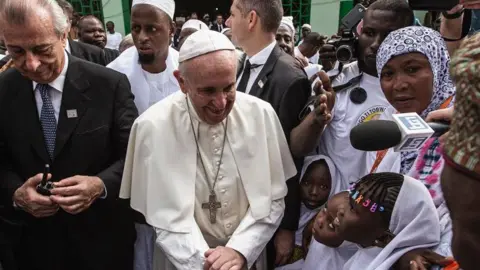Pope Francis’s recent passing has triggered an outpouring of grief and remembrance across the African continent, where his legacy is viewed as transformative. For millions of African Catholics – representing nearly a fifth (272 million) of the global Catholic population – and numerous national leaders, he was seen as a champion for marginalized communities and a voice advocating for justice within the institution of the Church. His visit to the Central African Republic in 2015, where he famously knelt before mosque leaders and called for an end to hatred, epitomized this stance.
The Vatican reports a remarkable surge in Catholic conversions across Africa over the past year – approximately seven million – solidifying the continent’s position as one of the fastest-growing regions for the Church. This growth is inextricably linked to Pope Francis’s deliberate efforts to foster inclusivity and recognize the unique challenges faced by African communities, particularly those ravaged by conflict and displacement. Numerous heads of state, including Nigeria’s Bola Tinubu and South Africa’s Cyril Ramaphosa, lauded his ‘tireless champion of the poor’ stance and highlighted his commitment to ‘inclusion [and] equality.’
Personal accounts from individuals across several African nations vividly illustrate the profound impact he had. In Accra, Ghana, Aba Amissah Quainoo described recalling his “joy” at the Pope’s dedication to the less fortunate, while Rev George Obeng Appah emphasized the widespread admiration for his compassion towards marginalized populations. At the Holy Family Basilica in Nairobi, Kenya, Rosemary Muthui remembered the Pope as a catalyst for change within the Church, particularly in promoting equality and fostering a sense of belonging. A poignant story emerged from Kinshasa, Democratic Republic of Congo, where journalist Kitsita Ndongo Rachel defied protocol to kneel before the Pope and request his blessing – an act driven by her belief in his teachings regarding justice for her conflict-ridden country.
The significance of this transformation extends beyond individual encounters. The Catholic Church’s growth in Africa is bolstered by significant weekly attendance rates, particularly high in Nigeria, Kenya, DR Congo, Cameroon, Uganda, and Angola. Charles Collins, managing editor of Crux, noted that Pope Francis’s physical presence in these marginalized areas – including his impactful mission to South Sudan in 2019, where he knelt before rival leaders urging peace – significantly raised the continent’s profile within the global Catholic hierarchy. Despite this growth and the emergence of African cardinals, representation at the highest levels of Vatican leadership remains disproportionately low.
The conversation now shifts to the future of the Church, with speculation intensifying regarding Pope Francis’ successor. Experts believe an African pontiff is not merely a possibility but an inevitability – a historic moment for a continent that has become a theological and demographic powerhouse within the Catholic world. Further reporting highlights the ongoing challenges in South Sudan, where fears remain about potential renewed civil war, underscoring the need for continued advocacy for peace and development, a priority Pope Francis consistently championed.

